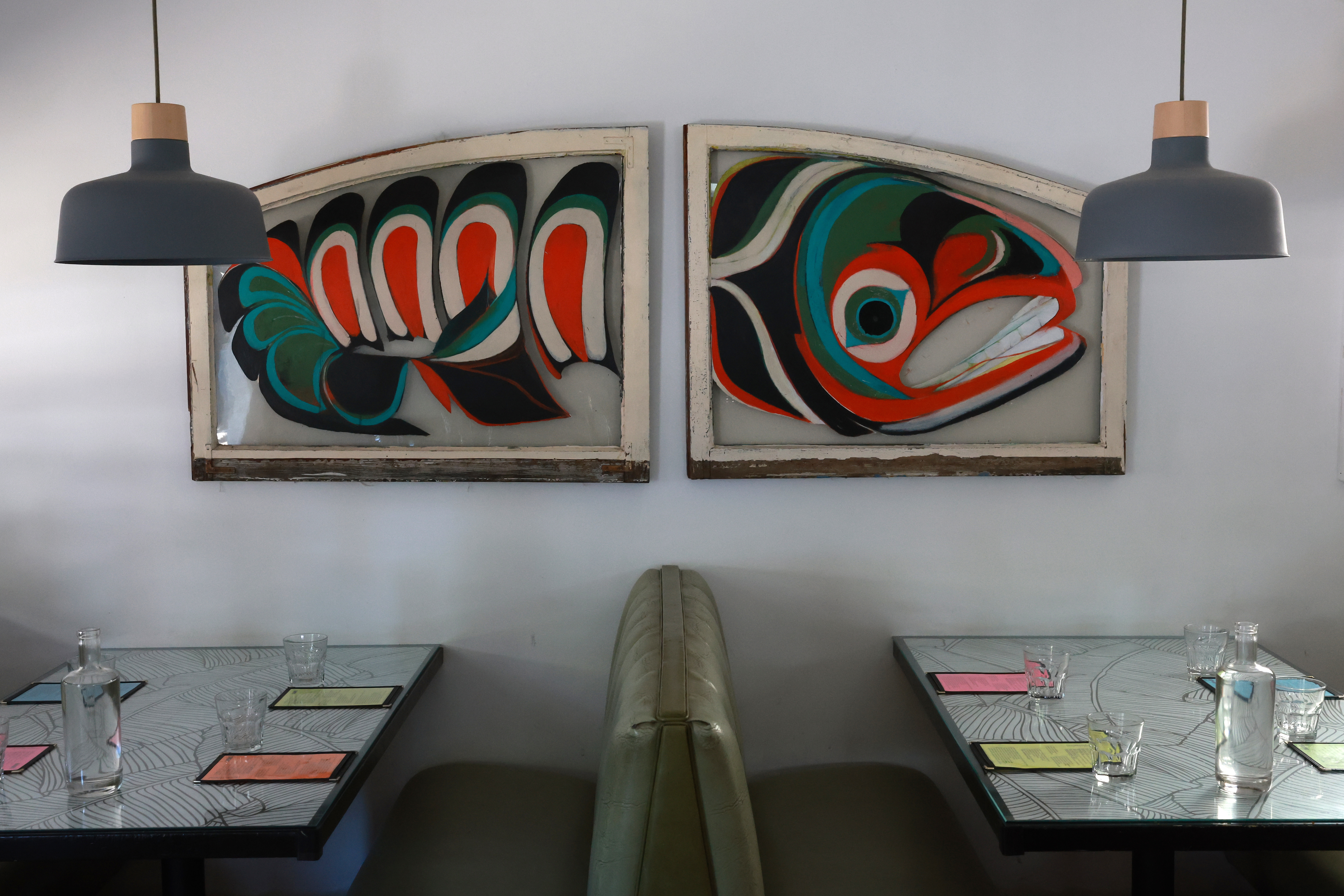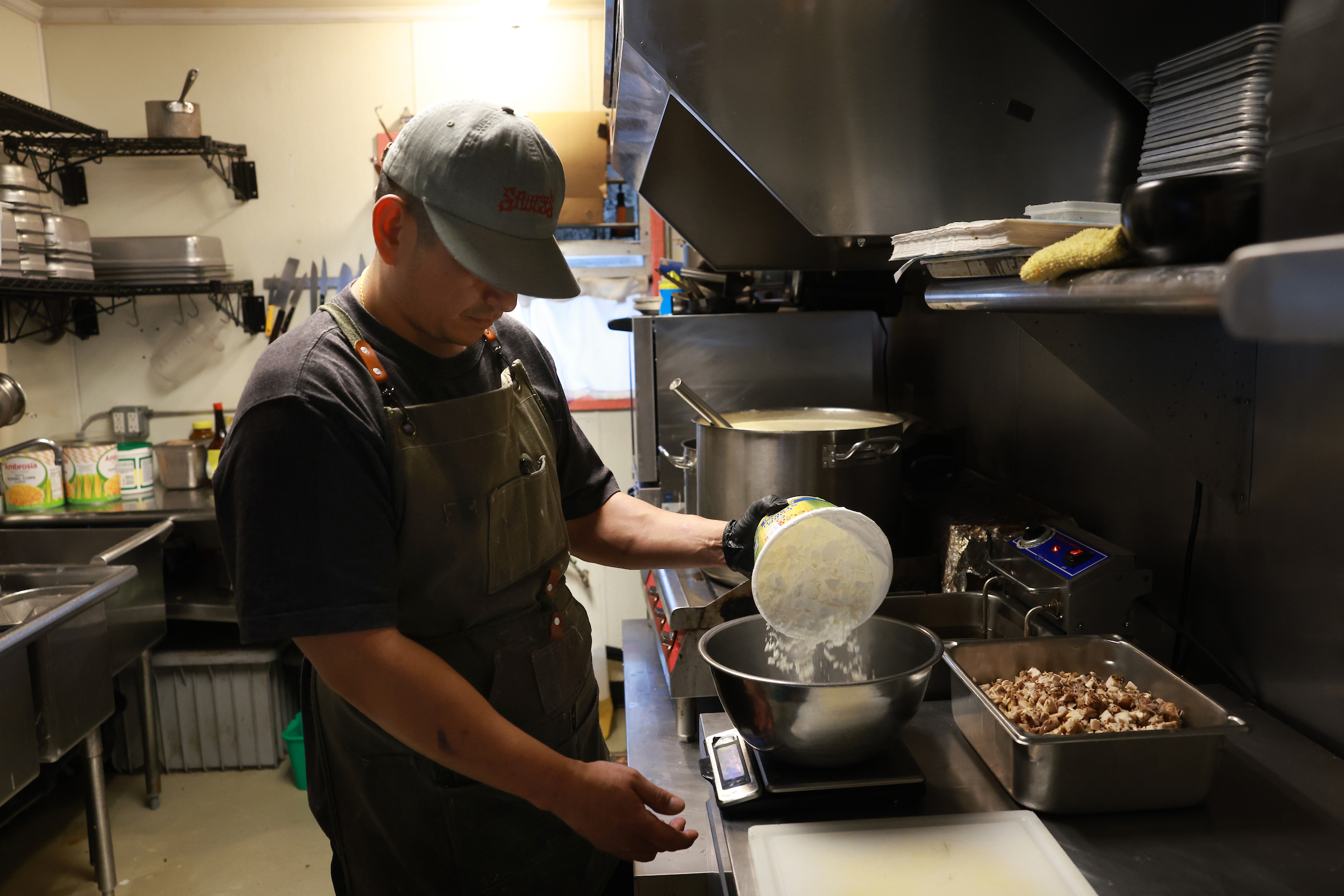Families, Friends and Good Food
Written by Andrew Binion
Tuesday, August 5, 2025
/0x30:2240x1459/prod01/channel_34/media/seattle-university/news-amp-stories/magazine/spring-sum-2025/Familyfriend_news.png)
Alum Elmer Dulla found success in a restaurant sketched from his roots.
The food that Elmer Dulla, ‘05, serves at his Guamanian restaurant Familyfriend has drawn applause from critics—the New York Times has taken note, as well as the prestigious James Beard Foundation—but don’t take the critics’ word for it. Rather, consider the line of eager diners known to queue up on Seattle’s Beacon Avenue to patiently wait their turn.
“Sometimes the line can be really long,” says Dulla, while sitting at the bar in his restaurant. The day’s work starts at about noon, hours before the first customers show up. Behind him in the kitchen staff preps for the 5 p.m. opening. Delivery drivers stop in with hand trucks loaded with boxes and hand over clipboards for his signature. “We're such a small space, once it fills up, then you wait. Our kitchen is a very tiny electric kitchen, so we can only make so much food as fast as we can.”
Not bad for a new restaurant that has eschewed a grand opening, traditional marketing and has—gasp!—kept itself off social media. Familyfriend doesn’t even have typical marquee signage directing patrons to its front door.
As celebrated as Dulla’s food is—Guamanian food is characterized as a mélange of different flavors and influences—there is more to the experience than the cuisine. Dulla’s connections to Seattle University run throughout the restaurant, from the menu design, which is inspired by Dulla’s time in Professor Naomi Kasumi’s art and design classes, to his coworkers, to the emphasis on giving diners a complete, home-cooked experience.
And though Dulla graduated 20 years ago, he still carries with him much of his experiences and education, from friends made to the exposure to new ideas and a degree in fine arts (with a specialization in digital design). His wife, Nicolette Carlos, ‘18, also went to SU, the place where Dulla learned to seek out his ultimate passion of food and restaurants, as well as the Jesuit values of serving others.
For Dulla, the past is also present, as he has joined forces with the RAMP-Up program through the Albers School of Business and Economics, which is providing him business expertise from students.
From working for the campus catering service—his first experience in the hospitality industry—and spending his first two years living on the sixth floor of Campion Hall after growing up on the western Pacific Island nation of Guam, Dulla credits his time at SU with not just intellectual, but personal growth.
“I had a lot of time just to think about things on my own,” Dulla says. “It helped me grow up and be more mature about decision making.”
A Space for Families and Friends
Familyfriend officially opened without fanfare, intentionally, in December 2023 behind a whitewashed brick facade of a 100-year-old building, standing out no more than any other house in the proudly diverse South Seattle neighborhood. Only an undersized “Familyfriend” sign hanging in the window gives a hint of what is inside. Sometimes a sandwich board is posted on the sidewalk with “Håfa Adai” written on it, the friendly greeting of “hello” in the Chamorro language of Guam.
The shades on the windows are intentionally kept drawn, creating a space separate from the outside world and to recreate the intimacy of a family gathering. Familyfriend also doesn’t accept takeout orders so that diners are served in the order they arrive (though the restaurant does accept reservations for larger groups). Houseplants decorate the simple interior, a movie plays on a TV in the background, adults chat at the bar, families sit at tables and patio out back creates the ambiance of a quiet backyard.
This is all by design.
“The name Familyfriend goes into the lifestyle that I grew up with, which is a big extended family,” says Dulla. “Then later finding out that none of us were really related by blood. So, it was just calling people aunt, uncle, cousin, but we weren’t really related. That family friend mentality kind of just stuck with me and that was kind of the drive for what we do in the space.”
He adds: “It was like we were throwing a family party every day.”
Biggest Breakout Moment
Entering SU as a civil engineering major, Dulla says math and science just made sense to him partly because there is one right answer.
Then he took Professor Kasumi’s art class as an elective and his mindset on a major shifted. “It blew my mind,” he says. Where math and science were easy, now he was doing something hard.
“There was no one answer,” he says. “And just having to really think on a conceptual level was probably the biggest breakout moment for me in my entire life.”
After graduating from the College of Arts and Sciences he worked for T-Mobile and Starbucks, then transitioned into 911 communications, a field that left him satisfied that he was doing important work, knowing how vital communications are in emergency situations.
But Dulla never lost touch with food, spending his evenings working in kitchens or tending bar.
“It was always something that I made sure that I was in,” he says. “It was just natural for me and it was just very social, which I love being in that type of setting.”
After 10 years in what he calls an “office job,” he returned to working in hospitality full time until opening Familyfriend—his first restaurant—the culmination of his time in the industry, in a space where friends had previously operated a restaurant.
“I kept it under wraps, it was very secretive,” he says of the rollout of Familyfriend. “I didn't really mention it to a lot of people. I just kind of wanted it to organically grow slowly just so we can figure out the space.”
That counterintuitive approach served him well. Relying almost solely on word of mouth, Familyfriend earned a spot on the New York Times’ 2024 Restaurant List of "Our 50 favorite Places in America Right Now" as well as being flagged as a 2025 James Beard Award semifinalist for “Best New Restaurant.”
But with the business expertise and coaching he receives from RAMP-Up, he is dialing in his management and accounting skills. The program also gives him a respite from the restaurant, allowing him to focus on the big picture for his business, by talking with a mentor or students, rather than making sure that evening’s dinner service goes smoothly.
“Which is very helpful for me because I'm very present in the restaurant space,” he says. “It gives me time to be away from it.”
A Hidden Gem?
Janie Ng, director of community impact at Albers and head of RAMP-Up, and her husband, who is Guamanian, heard about Familyfriend and made the trip to Beacon Hill to try it, but weren’t so sure at first that they found it.
“Where is it?” she asked.
“This is it,” her husband said at the time, as they stood in front of the plain white building. “This is the address.”
“OK,” she said. “There’s no sign on the door.”
Inside they not only found the bustling restaurant, but Ng’s husband affirmed the authenticity of the finadene sauce and red rice. And then she met Dulla, who was seated at the bar in a baseball cap and struck up a conversation about the possibility of working with RAMP-Up.
RAMP-Up, an acronym for Resource Amplification & Management Program (RAMP-Up), provides opportunities for business students and coaches to collaborate with business owners in Seattle’s Central Area and surrounding neighborhoods. Together they work to ensure local, homegrown businesses can withstand the torrents of change and gentrification that have left some neighborhoods unrecognizable.
Since beginning in 2017, RAMP-Up has engaged about 12 to 15 local businesses a year with three students, which they call client account managers, who are usually graduate students with real-world business acumen. Recently, Seattle University partnered RAMP-Up with the City of Seattle’s Liberty Project, which has steered many more businesses to the Albers students.
For Familyfriend, RAMP-Up is focusing on operational planning, strategic planning for marketing and access to capital.
“This is the beauty of RAMP-Up and being part of this university,” says Ng. “We actually mentor the students and train them to become proficient in consulting or coaching or even figuring out how to find grants and grant proposal writing.”
To date, the program has helped obtain about $1.5 million in grants for member businesses, ranging from retail stores to a daycare, “And most of them are written by students with help from the team here,” says Ng.
Now About the Food…
Though the Familyfriend hamburger has earned spots on several “best of” lists, it’s just one of the Guamanian dishes born out of the island territory’s colonial history and multicultural influences from Spain, Japan, Korea and the Philippines. Dulla does a little of everything in the restaurant and keeps the menu tight. His inclination is to forgo rotating seasonal dishes in and out, ensuring that each menu item has “signature” status so if you like a dish it will be there when you return.
As Seattle’s premier, if not sole, Guamanian restaurant, Dulla appeals to people unfamiliar with the island’s fare as well as Guamanians living in Seattle who want a taste of home but with a twist.
“I try to tap into flavors of things that I've eaten growing up based on time on Guam,” he says. “But also have it a little more elevated so that people that are from Guam don't get the exact same things that they could cook at home.”
Familyfriend also offers a version of batchoy, which Dulla describes as Filipino ramen, soup notable for its funky, umami flavor courtesy of fermented shrimp paste.
Dulla initially added “Da Kids Kewpie Burger and Truffles Fries” to the menu for young palates that might be daunted by the more complex items. It pays homage to his two dearly departed Chow Chow dogs Kewpie and Truffles, with Kewpie mayonnaise in the sauce and truffle oil on the fries. Critics hailed the burger, reaching such acclaim that it “went viral,” but some fans of the restaurant hold that the burger casts a shadow over Dulla’s more unique and innovative dishes.
Dulla sees it differently. His generation grew up eating McDonald’s and has a special fondness for that staple of picnics and cookouts.
“So now they're all adults, everyone loves eating burgers,” he says. "It gets people in, it gets them to try other things.”


/0x575:2400x2091/prod01/channel_34/media/seattle-university/news-amp-stories/images/Grammy-winner-professor-nice-pic-copy.jpg)
/0x54:1130x768/prod01/channel_34/media/seattle-university/news-amp-stories/images/1.-Trung-pham-work-on-display--copy-1130X821.jpg)
/127x0:2271x1354/prod01/channel_34/media/seattle-university/news-amp-stories/images/Eric-Gilbertson-goggle-mountain.jpg)